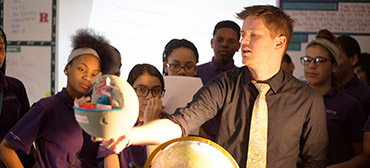Advice for Building the Parent Teacher Relationship

Building connections with the kids in your class is a vital part of being a teacher. Just as important is expanding those relationships outside of the classroom to encompass the whole family.

A strong education resume may well be the single most important tool for getting the job you want. It is the proverbial foot in the door and has to be both persuasive and compelling to get you past the employment gatekeepers.
“Your resume is the first, sometimes only impression you make on a school administrator,” says Veronica Harris, KIPP NJ’s Director of Talent Recruitment. “They have a specific type of person in mind when they’re looking to fill teaching positions and a large number of resumes to review. You have about 30 seconds to hook their attention and convince the reader that you’re worth speaking with directly.”
Here are five things that you can do to optimize your resume and increase your chances of getting noticed.
What your education resume looks like may be even more important than what it says. The reason? If a reader is overwhelmed with words, colors, graphics or other aesthetic elements, they won’t read what you’ve written.
Some easy tips for making your resume easier to read include:
Typos are a huge resume faux pas. Yet despite our best efforts, some may fall through the cracks. We recommend reading your education resume out loud, so you not only see the words, you hear them, too.
“Adding an extra sense into the proofing process can help you more easily spot errors in spelling, punctuation and language,” says Harris. “Microsoft Word also has a Read Aloud function in its Review tools that can make this even easier. As the voice speaks your text, you read along and make corrections.”
It’s also a good idea to give your resume to at least two other people to review. Having fresh eyes look over your text can lead to spotting errors that you may not have noticed in previous revisions.
The old rule of thumb for a resume was to make sure it is no longer than one page. Over the years, two-page education resumes have become more commonplace, especially for more experienced educators. Both are actually just fine when you’re applying for a job in education.
If you have a lot of experience you would like to highlight, we recommend a functional education resume structure rather than one that focuses on chronology. This will place your experience up front, where an administrator can easily see it. Then add in your work history. If you need a second page to complete this, try to fill up as much of that page as you can.
Newer teachers can feel confident submitting a one-page education resume, so long as it highlights your strengths and experiences related to teaching. Don’t feel like you have to add fluff to the text. Simpler is better.
Everyone has a success story to tell. Your education resume is the perfect place to tell some of yours. What did you deliver, push or drive that succeeded and to what degree?
“The specifics of where you’ve taught are important, but we really want to know more about your skills and achievements,” Harris says. “Showcase this first in your education resume and make it stand out to catch our attention.”
For experienced teachers, highlight special programs you’ve created, professional development achievements, innovations you’ve brought into the classroom and other such examples. Look back on your history and pull three to five examples that really tell the story of how you lead as an educator.
This is also good advice for newer teachers. Your job history will be short, but a brief overview of experiences you’ve had that could transfer to an education context gives the reader a better idea of who you are. Experiences to share could showcase skills in organization, project management, relationship building, etc., during internships, student teaching, volunteer roles or any other aspect of your life.
Stay away from generalizations as much as possible. You only have 30 seconds to make yourself stand out from the competition. Make every word count and as valuable as possible. Some ideas to start with:
Whether you’re new to the education job hunt or have been teaching for years, optimizing your resume is the first step in being successful in your search. Now that you have some ideas to work with, it’s time to take a fresh look at what your resume says about you.

Building connections with the kids in your class is a vital part of being a teacher. Just as important is expanding those relationships outside of the classroom to encompass the whole family.

Delivering a demo lesson is a common part of the hiring process for teachers. Learn what administrators expect from you and how to you can ace this sometimes intimidating portion of your interview.

See why working at a KIPP NJ school will be the most rewarding job you’ll ever have.